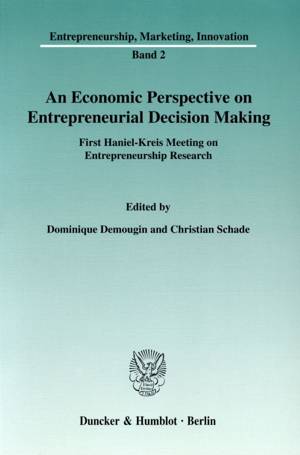
- Afhalen na 1 uur in een winkel met voorraad
- Gratis thuislevering in België vanaf € 30
- Ruim aanbod met 7 miljoen producten
- Afhalen na 1 uur in een winkel met voorraad
- Gratis thuislevering in België vanaf € 30
- Ruim aanbod met 7 miljoen producten
Zoeken
An N Economic Perspective on Entrepreneurial Decision Making
First Haniel-Kreis Meeting on Entrepreneurship Research
Paperback | Engels | Entrepreneurship, Marketing & Innovation | Entrepreneurship, Marketing, Innovation | nr. 2
€ 139,45
+ 278 punten
Omschrijving
This volume is dedicated to the first Haniel-Kreis, which took place in Berlin from the 4th to the 8th of January, 2005. The almost weeklong event was characterized by stimulating bilateral meetings, various scientific presentations, and intense discussions. One commonality among the authors is a growing interest in the application of economic models and econometrics to the field of entrepreneurship. Entrepreneurship, a comparatively young field of research, generates a growing interest by researchers from various fields including economics, psychology, sociology, operations research, and management (to name only the most influential). The Kreis focuses on an economic perspective by emphasizing expertise from behavioral economics, operations research, and management. This book addresses pivotal areas of entrepreneurial decisions. The topics include the decision to start a business and the identification and analysis of the factors, environments, and prerequisites that led to this decision, such as age (Levesque and Minniti), perceptions about personal ability (Köllinger et al.), and the institutional environment in a country (Choi and Phan). A related question is the decision on succession in a family business and the organization of the transfer from one generation to the next (Phan et al.). Finally, the design of an incentive compatible wage scheme that covers the area of entrepreneurial decision-making (Demougin and Fluet) is discussed.
Specificaties
Betrokkenen
- Uitgeverij:
Inhoud
- Aantal bladzijden:
- 121
- Taal:
- Engels
- Reeks:
- Reeksnummer:
- nr. 2
Eigenschappen
- Productcode (EAN):
- 9783428121861
- Verschijningsdatum:
- 29/06/2006
- Uitvoering:
- Paperback
- Formaat:
- Trade paperback (VS)
- Afmetingen:
- 155 mm x 231 mm
- Gewicht:
- 1759 g

Alleen bij Standaard Boekhandel
+ 278 punten op je klantenkaart van Standaard Boekhandel
Beoordelingen
We publiceren alleen reviews die voldoen aan de voorwaarden voor reviews. Bekijk onze voorwaarden voor reviews.







